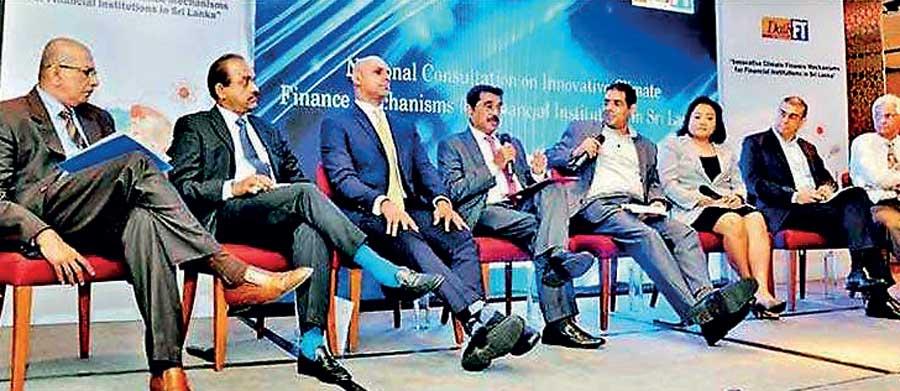10 Dec 2019 - {{hitsCtrl.values.hits}}

Panel discussion on climate finance
 The National Consultation on Climate Finance Mechanisms for Financial Institutions in Sri Lanka organized by ICC Sri Lanka together with UNESCAP brought together professionals from several sectors to discuss pressing issues in promoting climate-resilient investment from the private sector.
The National Consultation on Climate Finance Mechanisms for Financial Institutions in Sri Lanka organized by ICC Sri Lanka together with UNESCAP brought together professionals from several sectors to discuss pressing issues in promoting climate-resilient investment from the private sector.
The national consultation is a platform to obtain feedback from key stakeholders to establish the next modalities in fostering climate finance for a sustainable future. The key objective of the event was to strengthen implementation of the 2030 Agenda for the Sustainable Development Goals in Sri Lanka.
Challenges
In Sri Lanka, the lack of a clear definition of green and social projects makes it difficult for banks, institutional investors and other key stakeholders to identify eligible sustainable projects and then allocate capital towards these projects while measuring sustainable stocks, flows and performance.
Green bonds are relatively new to Sri Lanka. A Green Bond is a bond whose proceeds are used to fund environment-friendly projects. They are increasing in popularity with investors at an exponential rate.
Green bond issuance is expected to clear over US$ 250 billion by 2019. Although they’re a relatively new segment of the bond market, investors are keen to invest in environmentally conscious offerings that define green bonds.
Examples of green bond projects are those related to clean water, renewable energy, energy efficiency, river and habitat restoration, acquisition of land, or mitigation of climate change impacts.
Many bond funds invest a portion of their capital to such causes, but green bond funds are those specifically invested in environmental initiatives. Green bonds typically carry the same credit rating as their issuers’ other debt obligations.
Investing in Green Bonds
Green bonds provide investors with a way to earn tax-exempt income, in addition knowing that the proceeds of their investment are being used in a responsible, positive manner. The issuers of green bonds also benefit, since the green angle can help attract a new subset of investors, namely younger investors, whom the issuers can profit from over an extended period vs. a base of older investors.Higher demand for green bonds equates to lower borrowing costs. Lower borrowing costs means reduced expenditures, which are then passed down to the investor in the form of a dividend or lower operating costs for the exchange-traded fund (ETF) or bond. U.S. municipalities have been issuing bonds for the specific purpose of funding for years, although usually without an easily identifiable green designation, often a mix of green bonds, using the proceeds to fund developments in water infrastructure through
the State.
Way forward
What constitutes a green investment are somewhat open to debate, although with more bonds being issued regularly, the definition is expanding as the market
expands regionally.
These issuances proved popular among both individuals and institutions that are compelled, by charter, to dedicate a portion of their cash to green investments. Generally speaking, it’s reasonable to expect that green bonds will deliver longer-term returns.
In the short term, however, performance may be somewhat lower than government debt due to the lower liquidity of green bonds, although as more are issued, liquidity will cease to be an issue.
In Sri Lanka due to the absence of development banks and development finance institutions that are often the major financiers of infrastructure, the State banks could play a stronger role in supporting the transition to low-emission and sustainable development. As a country we need to identify the barriers, risks and potential opportunities for scaling up
climate finance.
Three key actions are proposed for governments and the banks themselves: strengthen mandates and incentives, mobilize new investors and sources of finance to create new climate markets, and use concessional finance strategically to deliver a sustainable future for our enterprises.
(The writer is Chairman of ICCSL)
27 Dec 2024 28 minute ago
27 Dec 2024 43 minute ago
27 Dec 2024 55 minute ago
27 Dec 2024 59 minute ago
27 Dec 2024 1 hours ago